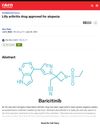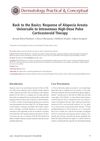24 citations,
March 2009 in “Archives of dermatological research” The combination of oral PUVA and corticosteroids helps regrow hair in severe alopecia areata.
 17 citations,
January 2019 in “Dermatologic Therapy”
17 citations,
January 2019 in “Dermatologic Therapy” Tofacitinib is effective and safe for long-term treatment of severe alopecia areata, with many patients achieving complete hair regrowth.
12 citations,
July 2016 in “Journal of dermatology” Intramuscular triamcinolone acetonide is an effective treatment for severe alopecia areata, especially in males.
 12 citations,
November 1996 in “Australasian journal of dermatology”
12 citations,
November 1996 in “Australasian journal of dermatology” A kidney transplant patient on cyclosporin experienced unexpected severe hair loss, which improved with treatment adjustments.
 11 citations,
January 2018 in “Acta dermato-venereologica”
11 citations,
January 2018 in “Acta dermato-venereologica” Tofacitinib works better and is more tolerable for severe alopecia than conventional treatments and DPCP immunotherapy.
 9 citations,
May 2021 in “International Journal of Dermatology”
9 citations,
May 2021 in “International Journal of Dermatology” The trial showed that a new under-the-tongue treatment for severe hair loss was somewhat effective in a small group of people.
 5 citations,
November 2019 in “Dermatology and therapy”
5 citations,
November 2019 in “Dermatology and therapy” Beard hair extraction improves scalp hair restoration results in East Asian men with severe hair loss.
 5 citations,
May 2018 in “Journal of the American Academy of Dermatology”
5 citations,
May 2018 in “Journal of the American Academy of Dermatology” Lower vitamin D levels might be linked to more severe alopecia areata, but more research is needed to understand if vitamin D can help treat it.
 4 citations,
November 2021 in “Journal of Clinical Medicine”
4 citations,
November 2021 in “Journal of Clinical Medicine” Higher levels of CCL7 are linked to more severe hair loss in alopecia areata patients.
 2 citations,
April 2017 in “Journal of Investigative Dermatology”
2 citations,
April 2017 in “Journal of Investigative Dermatology” Tofacitinib helped over half of the patients with severe hair loss regrow at least 50% of their hair.
 1 citations,
June 2022 in “JAMA”
1 citations,
June 2022 in “JAMA” Baricitinib, a medication taken by mouth, was effective in regrowing hair for people with severe hair loss.
 1 citations,
October 2020 in “Journal of Cosmetic Dermatology”
1 citations,
October 2020 in “Journal of Cosmetic Dermatology” Using minoxidil and tofacitinib together can effectively treat severe hair loss.
 1 citations,
January 2020 in “Surgical & Cosmetic Dermatology”
1 citations,
January 2020 in “Surgical & Cosmetic Dermatology” Combining oral minoxidil with JAK inhibitors helps regrow hair in severe alopecia areata cases.
 October 2024 in “International Journal of Research in Dermatology”
October 2024 in “International Journal of Research in Dermatology” Tofacitinib is a promising and safe treatment for moderate to severe alopecia areata.
 October 2024 in “Journal of the European Academy of Dermatology and Venereology”
October 2024 in “Journal of the European Academy of Dermatology and Venereology” Ritlecitinib and baricitinib are similarly effective for hair regrowth in severe alopecia areata.
 June 2024 in “Military medicine”
June 2024 in “Military medicine” JAK inhibitors like baricitinib and ritlecitinib are effective new treatments for severe alopecia areata.
 June 2024 in “Australasian Journal of Dermatology”
June 2024 in “Australasian Journal of Dermatology” Tofacitinib is safe and effective for treating moderate-to-severe alopecia areata.
 April 2024 in “Expert opinion on investigational drugs”
April 2024 in “Expert opinion on investigational drugs” JAK inhibitors are safe and effective for treating moderate-to-severe alopecia areata.
 January 2024 in “JEADV clinical practice”
January 2024 in “JEADV clinical practice” The study helps doctors use patient images to understand and apply SALT scores for treating severe alopecia areata.
 September 2023 in “PubMed”
September 2023 in “PubMed” Baricitinib is a relatively safe and effective treatment for severe alopecia areata.
 April 2023 in “Journal of Pakistan Medical Association”
April 2023 in “Journal of Pakistan Medical Association” Baricitinib is effective in promoting hair growth in severe alopecia areata.

Combining epinephrine with a steroid may help regrow hair in severe alopecia areata cases.
 June 2022 in “C&EN global enterprise”
June 2022 in “C&EN global enterprise” The drug Olumiant is now approved to treat severe hair loss from alopecia and can also be used for some hospitalized COVID-19 patients.
 December 2021 in “Benha Journal of Applied Sciences”
December 2021 in “Benha Journal of Applied Sciences” Higher Claudin 3 levels in the blood are linked to more severe alopecia areata.
 October 2021 in “Dermatology practical & conceptual”
October 2021 in “Dermatology practical & conceptual” High-dose corticosteroids can significantly regrow hair in severe alopecia areata.
JAK inhibitors show promise in treating moderate to severe alopecia areata.
September 1998 in “Journal of the European Academy of Dermatology and Venereology” PUVA-turban therapy can help some people with severe alopecia areata regrow hair.

Men with higher body mass index (BMI) in Taiwan tend to have more severe hair loss.
46 citations,
June 1990 in “Archives of dermatology” Combining 5% minoxidil and 0.5% anthralin can help regrow hair in some severe alopecia areata patients.
 27 citations,
October 2020 in “Experimental Dermatology”
27 citations,
October 2020 in “Experimental Dermatology” Having a lot of gray hair and hair loss are linked to more severe COVID-19.
























